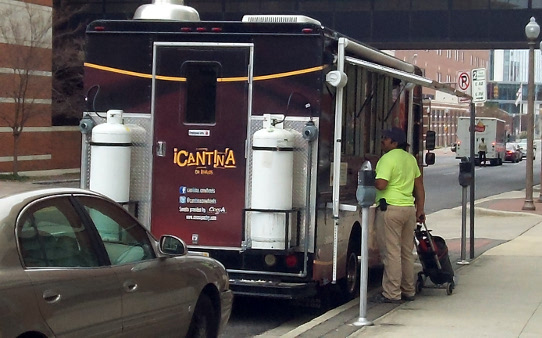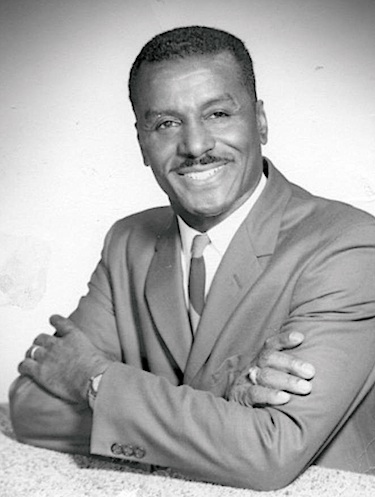NOTE: The following is an open letter that was posted as a note to Facebook at 8:24 a.m. December 5, 2012. Shaun Chavis has given us permission to re-post it here in its entirety. Links have been added where appropriate.
Dear Mayor Bell and Councilors of Birmingham,
I am Shaun Chavis, a citizen of Birmingham. Professionally, I am a cookbook editor for Oxmoor House/Time Home Entertainment, Inc. In my spare time, I co-own and organize FoodBlogSouth, LLC, a food blogging conference held annually in Birmingham that attracts food bloggers to Birmingham from across the South and the U.S.
In 2012, our second year, FoodBlogSouth had an impact of more than $110,000 on Birmingham’s economy, as estimated by the Greater Birmingham Convention and Visitors Bureau. FoodBlogSouth also benefits the Desert Island Supply Co., a non-profit children’s writing center in Woodlawn.
FoodBlogSouth has brought new attention to Birmingham’s food scene by bringing hundreds of bloggers and food professionals here to spend money in the city’s hotels and restaurants. Those bloggers go home and write about Birmingham, some of them for professional online and print publications, including the New York Times. In addition, FoodBlogSouth has attracted national corporate sponsors such as Goo Goo Cluster, Roland Foods, Welch’s, Harvard Common Press, and Evernote, who have come to Birmingham to see what our city has to offer.
 I am writing you today because I am troubled by the proposed food truck ordinance, as presented in Bob Carlton’s article in The Birmingham News on November 13. As an owner of FoodBlogSouth, a business built in part upon the food scene and food tourism that Birmingham has to offer, I must ask that you reconsider sections of this proposed ordinance. I also write as a journalist and food advocate who wants to see our city do all it can to support small business and grow our local economy. The proposal that food trucks sell food for no more than two hours of service at a time, have service hours dictated by the city, and pay higher fees for operating in certain parts of the city are too restrictive and unrealistic. Specifically:
I am writing you today because I am troubled by the proposed food truck ordinance, as presented in Bob Carlton’s article in The Birmingham News on November 13. As an owner of FoodBlogSouth, a business built in part upon the food scene and food tourism that Birmingham has to offer, I must ask that you reconsider sections of this proposed ordinance. I also write as a journalist and food advocate who wants to see our city do all it can to support small business and grow our local economy. The proposal that food trucks sell food for no more than two hours of service at a time, have service hours dictated by the city, and pay higher fees for operating in certain parts of the city are too restrictive and unrealistic. Specifically:
- The suggested two-hour limit and suggested hours for meal times do not take into consideration special events such as FoodBlogSouth, The Sidewalk Film Festival, and others. These events benefit from having food trucks operate as part of an event and for longer than two hours, in locations near a specific event venue, and outside of the suggested meal times. This is restricting the options we have to make our events attractive.
- The suggested breakfast, lunch, and dinner hours for food trucks disregard the fact that many food trucks do not serve meals per se; they also serve food that can be consumed at any time and foods that do not constitute part or all of a meal (such as coffee, cupcakes, doughnuts, frozen desserts, snacks, and more). In addition, the suggested hours assume that people eat meals at prescribed times. The proposed hours do not take into account that many people have different meal times due to their work schedules and other demands of daily life. I would also like to make the point that food trucks provide high-quality, low-cost meals; many of Birmingham’s food trucks, such as Shindigs, use locally produced and sometimes organic ingredients, which are healthier than standard fast-food offerings of comparable cost. They also further support the local economy by sourcing ingredients from local producers.
- In shopping malls and airports, food businesses are often right next to each other. The language in the proposed food truck ordinance suggesting a distance between food trucks and brick-and-mortar restaurants seems unfairly targeted against food trucks.
- I am concerned that the hours, fees, and restrictions you propose are restrictive to the point that it would not be profitable at all for anyone to run a food truck business; and in fact, several food truck owners have said the proposed ordinance would make vending unprofitable and force them out of business.
My last point, I feel, touches on a much larger issue that I ask the mayor and city councilors to take into serious consideration: The city needs to do more to encourage small business. With high nationwide unemployment rates and a lagging economy, I think it would be obvious that this should be a priority in Birmingham.
Nationwide, food trucks have been an engine of economic growth and employment, and have helped revitalize cities such as Portland (Ore.) and Austin (Texas). Both of these cities have become nationally recognized for their food truck scenes, which have been a big draw for events, corporate recruitment and broader economic and community revitalization efforts. Events have been built around food trucks themselves—Los Angeles, Boston, New York, Las Vegas, and Columbus, Ohio have food truck festivals—that again boost the economy with tourism.
I know many talented, enterprising people who want to start a food business, but the costs can be prohibitive. Organizations around Birmingham are helping to support these entrepreneurs, but the city needs to do more to help these small businesses and, in turn, our overall local economy.
The proposed food truck ordinance, with its fees and hour and distance restrictions, will do just the opposite: It will to deliver a blow to people who are trying to start an honest business on a small scale. It will send a strong and clear message that Birmingham is not a place that encourages fair competition in the marketplace. It will indirectly hurt tourism in Birmingham. And it will mark Birmingham as regressive, as a place not willing or able to stand up to pressure from brick-and-mortar restaurant owners who fear healthy, fair competition.
I hope that you, Birmingham’s leaders, will choose to protect free enterprise. I hope you will decide the appropriate response to any business owner who fears new competition is to suggest that he or she innovate to remain competitive. In fact, many brick-and-mortar restaurants in Birmingham are doing just that by opening food trucks and carts of their own.
Please reconsider the impact the proposed ordinance will have on the economic and cultural health of our city. Remove the time and distance restrictions and location-based fees. I encourage you to set aside the current propose legislation and create a food truck ordinance with language limited to matters of public safety and public health. Prohibit regulations based on competition. There are also alternative solutions used in other cities that are favorable both to brick-and-mortar restaurants, food trucks, and public health and safety, such as lot-based vending, which many food truck owners in cities like Portland (Oregon), Austin, and Miami find preferable to vending on the street. Food trucks should be allowed the same operating hours as any other food service business, and the same opportunities to grow and become part of Birmingham’s employers, tourist scene, and economic engine.
My best regards,
Shaun Chavis
Co-owner, FoodBlogSouth, LLC





 Martin Luther King came to Birmingham in 1963 at the invitation of Reverend
Martin Luther King came to Birmingham in 1963 at the invitation of Reverend 

Regarding the City of Birmingham and Feeding the Homeless
EDITOR’S NOTE: There has been a great deal said recently about the food truck ordinance passed late last year and how it’s affecting outreach efforts in the City of Birmingham. Matt Lacey, the senior pastor of downtown’s Church of the Reconciler, has written this piece and shared it via social media and email. I felt it needed another, more openly accessible, place to reside. Links have been added by me where they seemed appropriate. As usual, comments are welcome and his contact information is below (though his email inbox was full as of this posting). ACN
One good way to make kind-hearted folks mad is to tell them it’s illegal for them to show that kindness.
Over the past couple of days here in Birmingham you may have heard reports in the media about the City of Birmingham threatening to arrest people for passing out food to the homeless in public parks and other gathering places.
The Mayor and City Council have said that they didn’t intent to create this type of environment by passing the food truck ordinance last year. Let me take some time to debunk that right away. This text is taken from page 9 of the aforementioned ordinance passed by the City Council:
Why would someone think to include religious and charitable organizations in the ordinance? More than likely they were attempting to bury legislation similar to other cities such as Raleigh, NC and others who have cracked down on public feedings in parks. In short: I think they knew what they were doing when they passed it.
To the issue of feeding at public parks: do churches, organizations, and volunteers need to have a conversation about the effectiveness of public feedings and the need for more permanent and ongoing help for the homeless? Absolutely. Is simply feeding at parks the best way to offer care for the homeless? Well, one could argue that you could do a lot more to offer more comprehensive care.
Organizations like ours-Church of the Reconciler-and the Firehouse Shelter, One Roof, and many others, frequently preach the need for more comprehensive services above and beyond just feeding the homeless. And there is certainly a lot to talk about. But is threatening to arrest people for feeding in public places a way to open up and have that conversation? Absolutely not.
Simply put: I’m not a public policy expert or a politician, but this isn’t going over well for the City of Birmingham. There are better ways to address this issue and have this conversation.
Mayor Bell, who in full disclosure was gracious enough to address one of our fundraising events several years ago, said that this is an effort to consolidate and organize services for the homeless through One Roof. That sounds really good, and One Roof does a great job of coordinating all these efforts currently.
Case in point: when police told Bridge Builders Ministries that they couldn’t serve the homeless outdoors any longer, we had a conversation with their leaders and opened our doors to create a more coordinated effort.
But if the Mayor and the City (and State of Alabama for that matter) are serious about this, it’s time they start providing more resources to care for those on the streets. Simply put: it’s time for Birmingham to stop talking and start doing.
I would like to issue an invitation to the Mayor and City Council members: come down to one of our organizations where, day after day, we offer care to those who need it most, rather than just bury something in an ordinance somewhere. Come and visit with those who suffer with mental illness and tell them, as we do, that there is little to no help we can offer because the State of Alabama lacks the resources (and will) to adequately address the issue. Come and argue, which I do on a weekly basis, with the drug dealers who prey on our population and help keep them in the cycle of addiction.
If we are going to talk about the need for more comprehensive help for the homeless, it’s probably best to not intimidate those attempting to do something about it, even those who might be well-intentioned but need to be more educated.
If the City wants to talk about the homeless in Birmingham, and ways they can help with the community my door is always open, as it has been.
Maybe this is the spark this City needs to starting talking about the issue of homelessness and poverty, which we have only treated with Band-Aids in the past, when in reality it needs comprehensive, holistic, and preventative care.
Rev. Matt Lacey
Senior Pastor, Church of the Reconciler
matt@churchofthereconciler.com
facebook.com/churchofthereconciler
Leave a comment
Posted in Commentary, guest
Tagged Birmingham, Commentary, feeding, guest, homeless, Matt Lacey